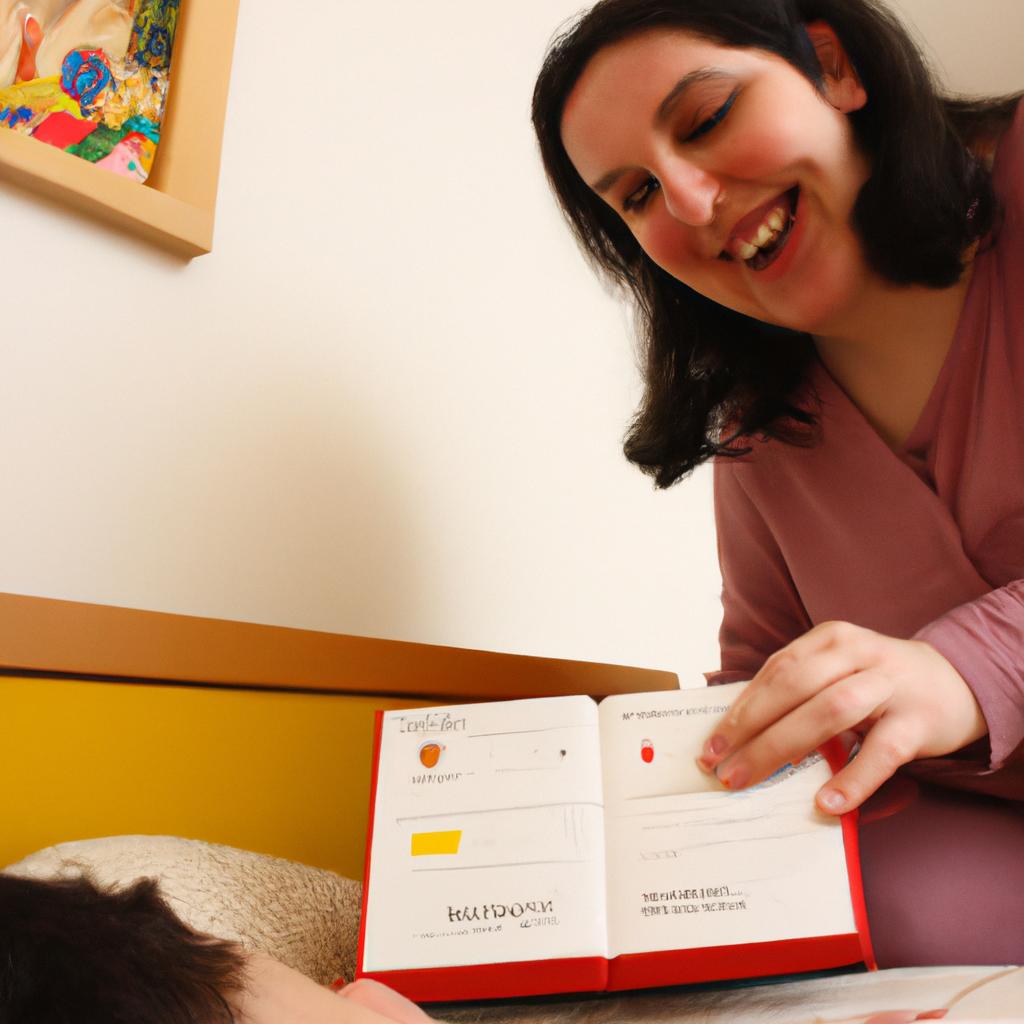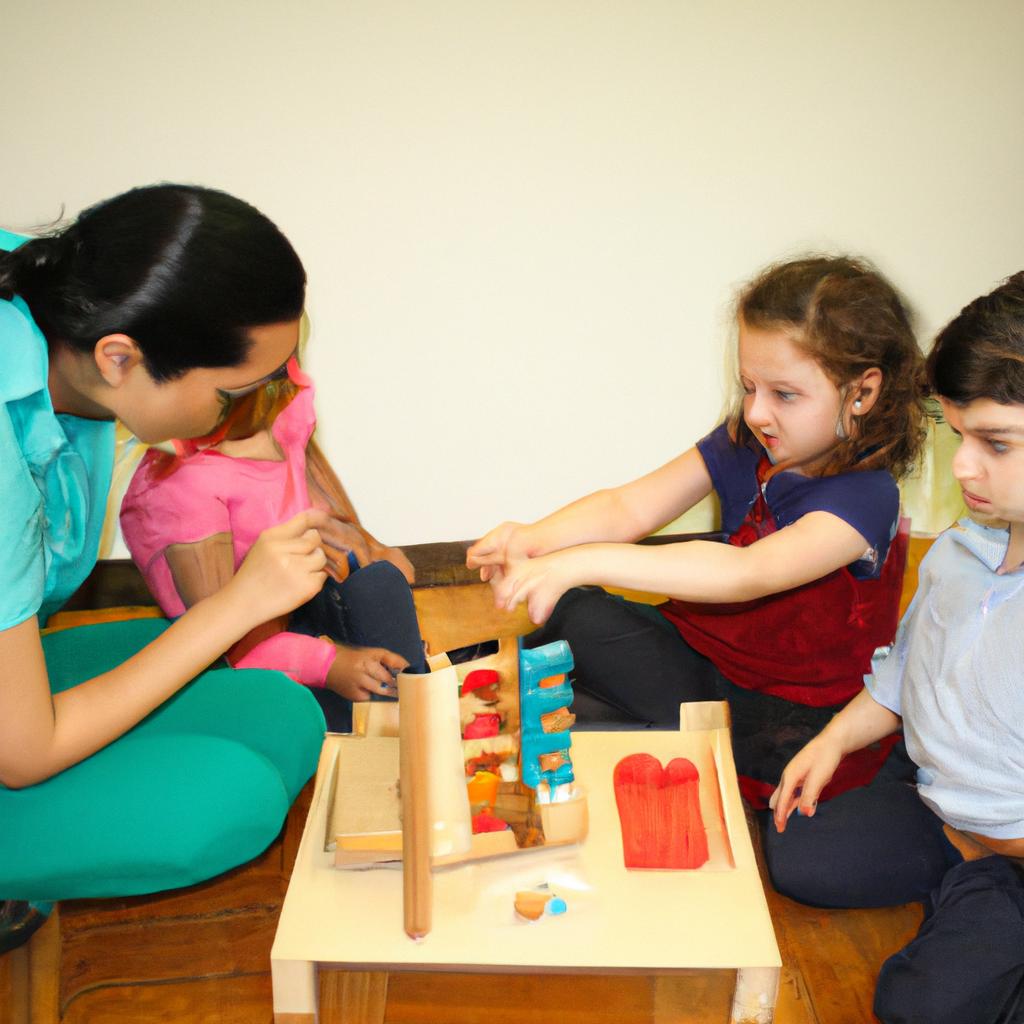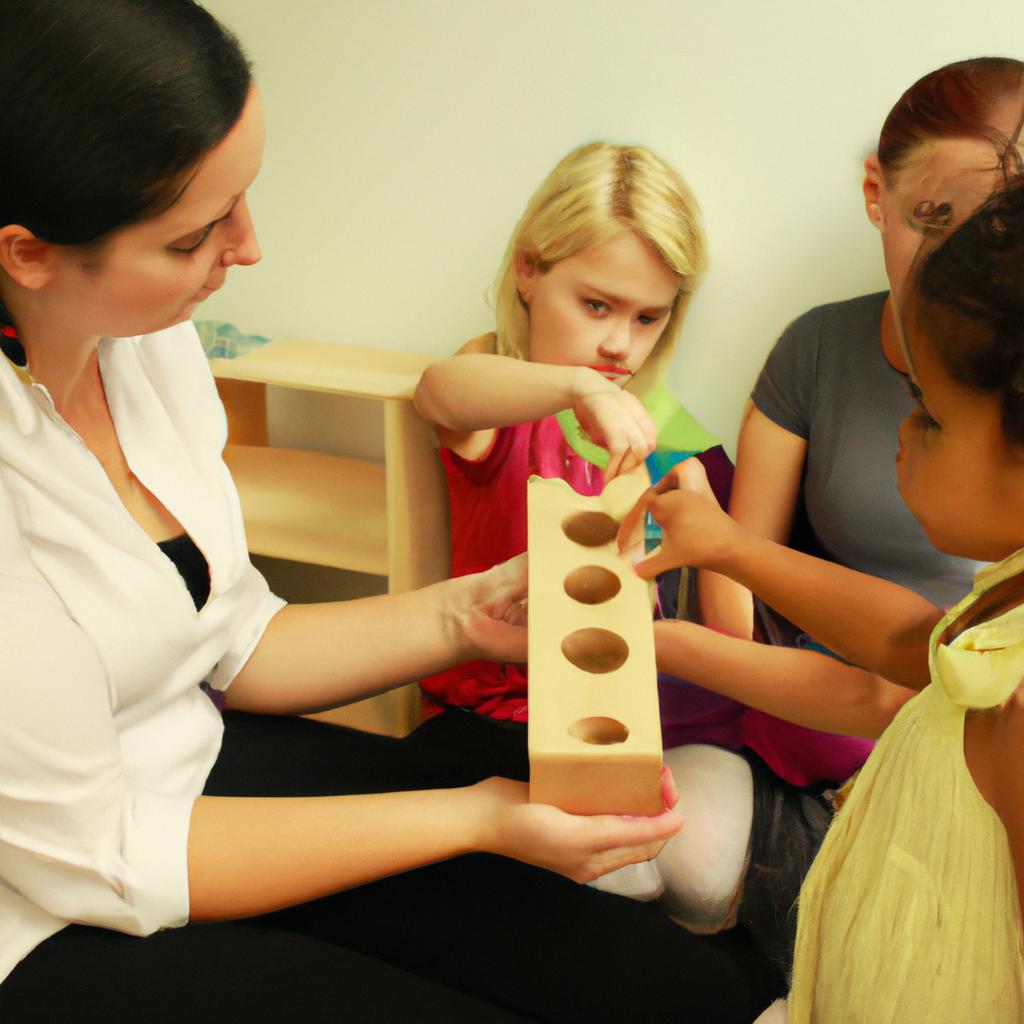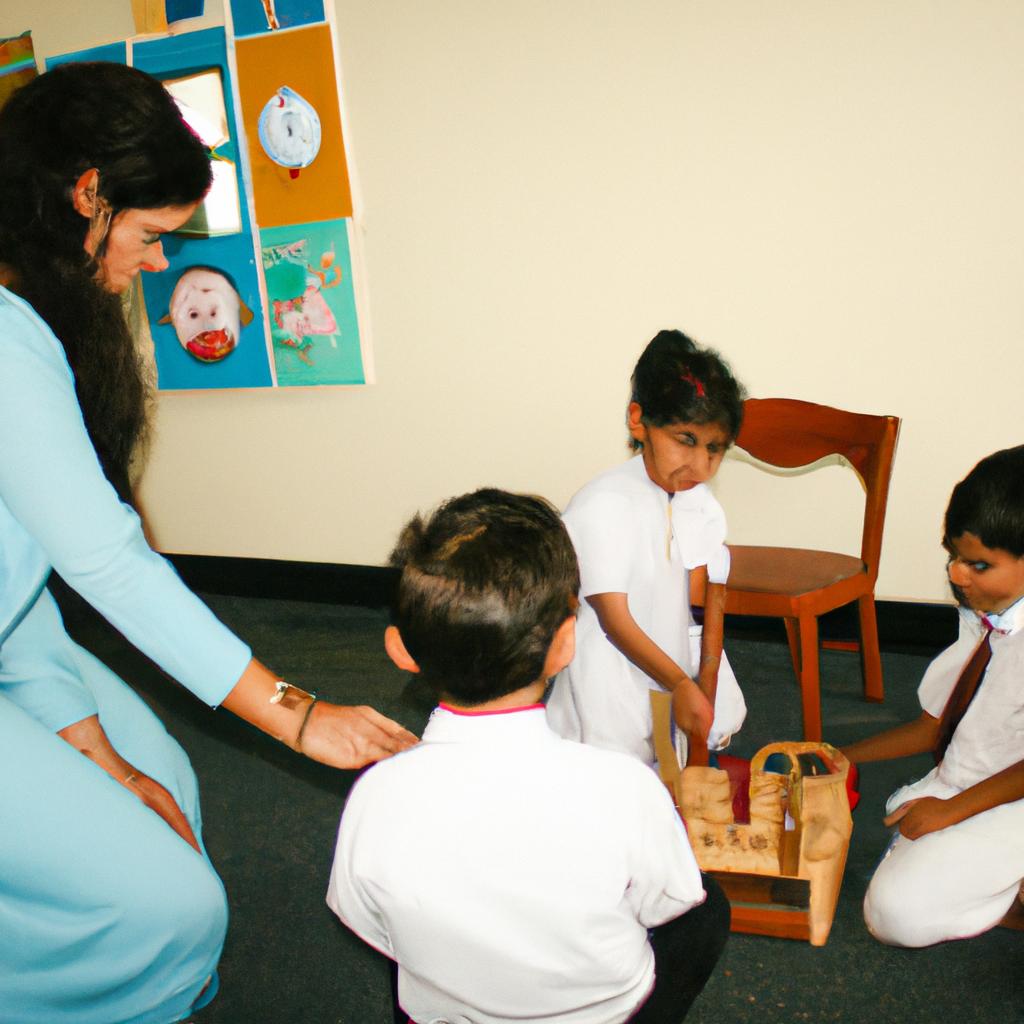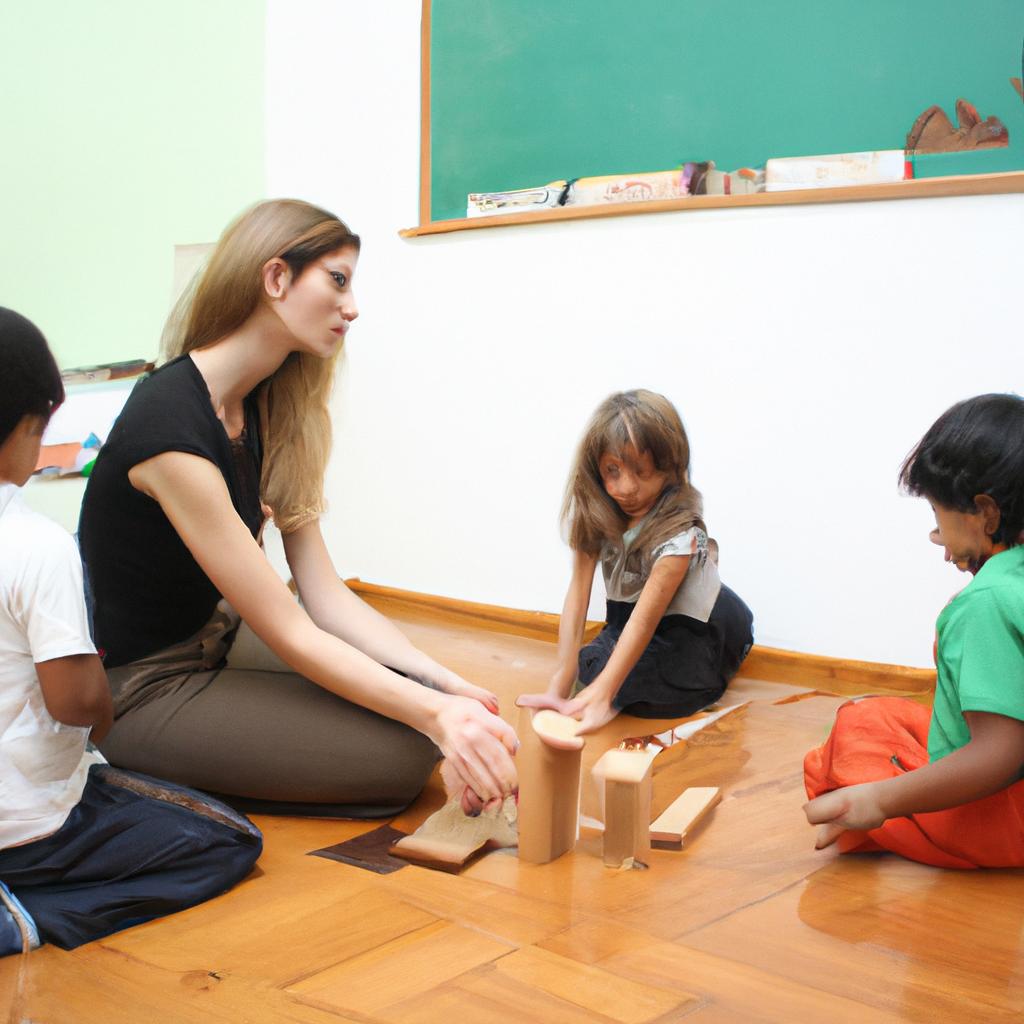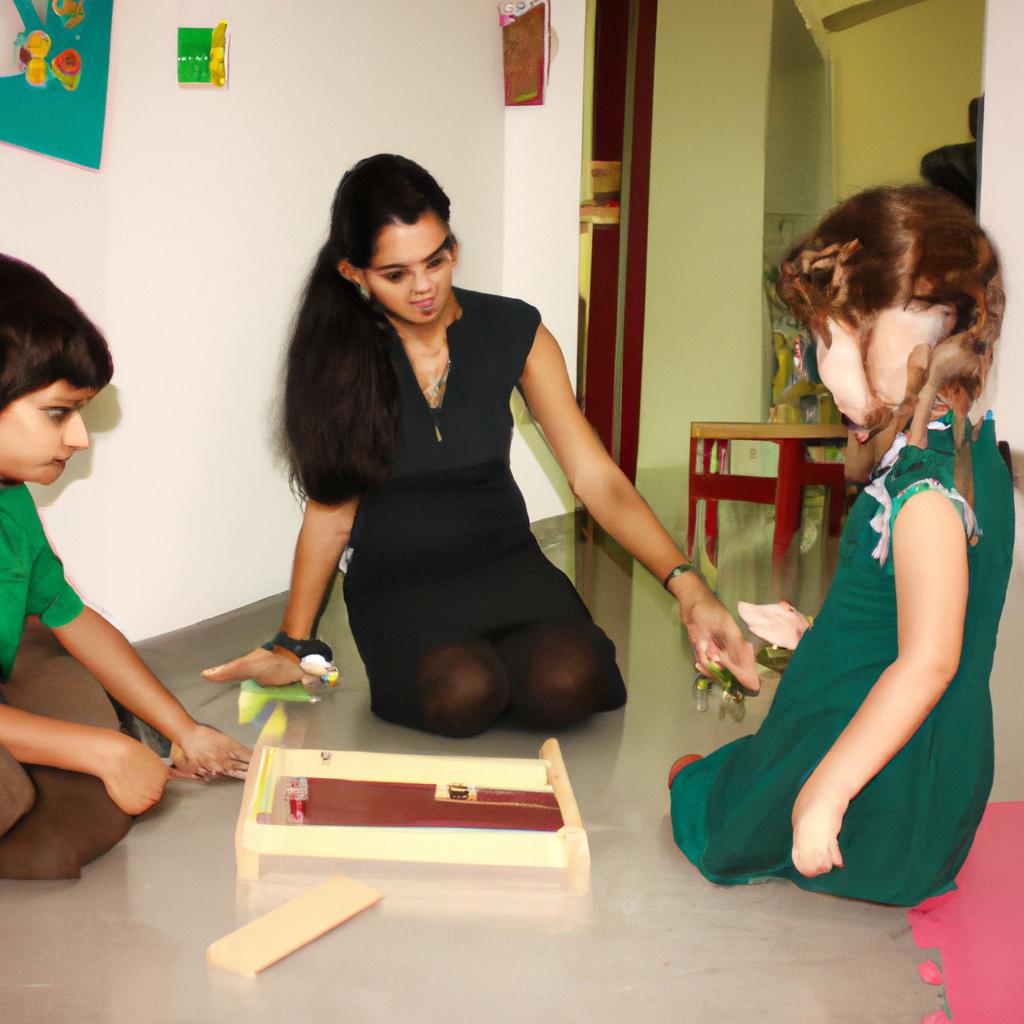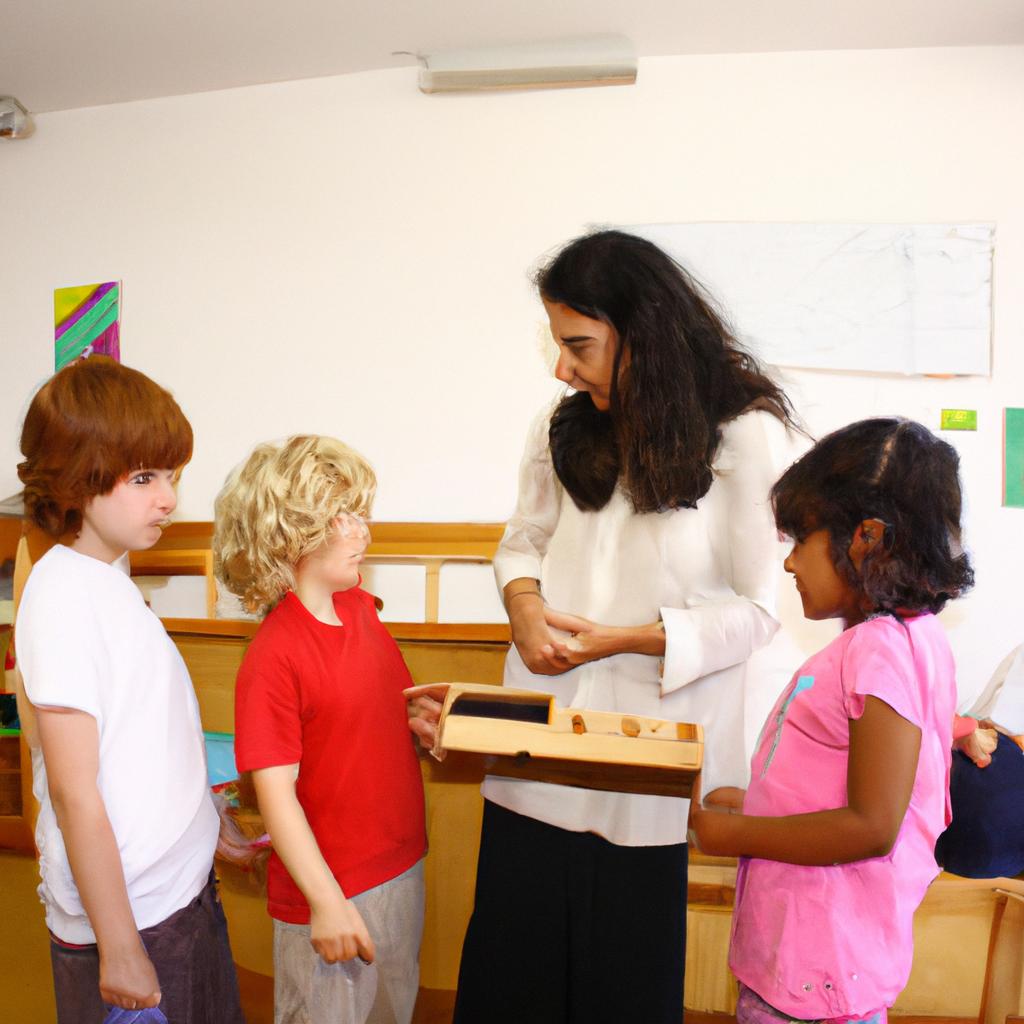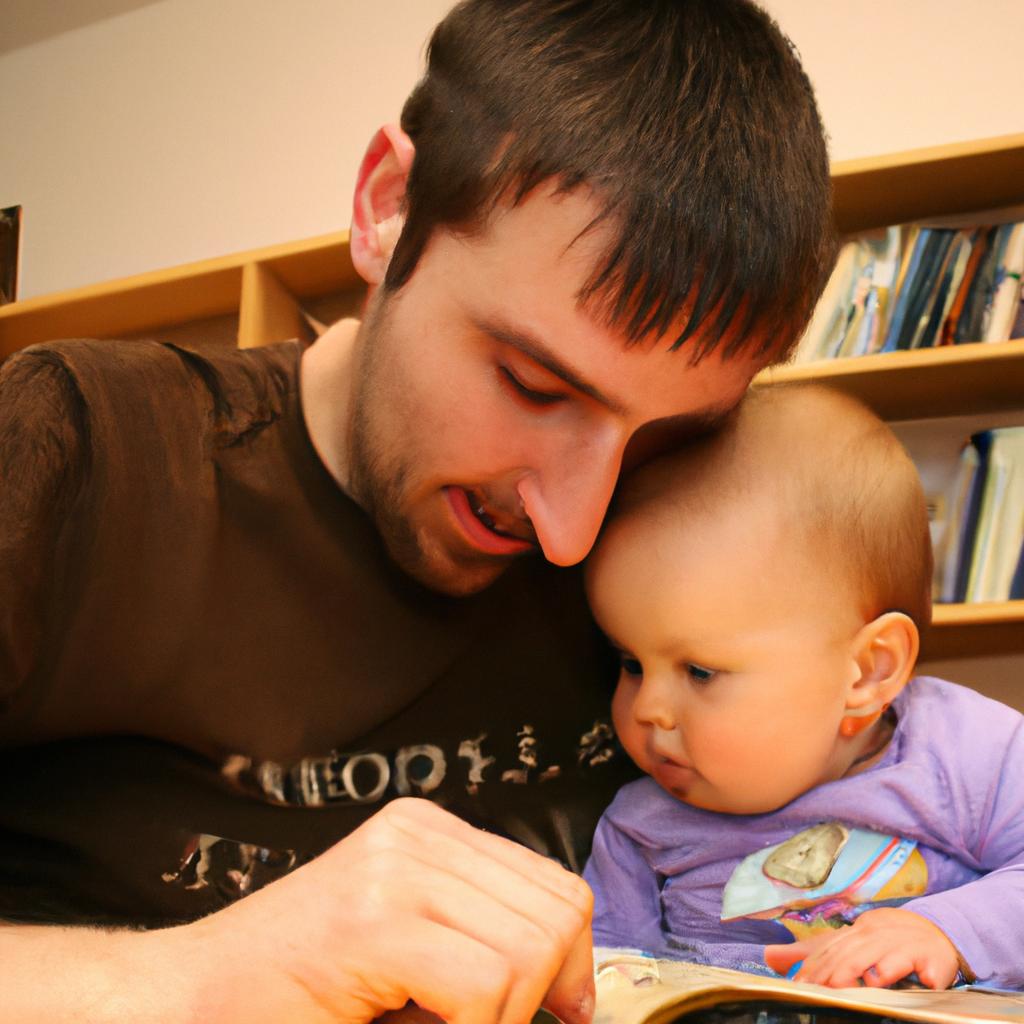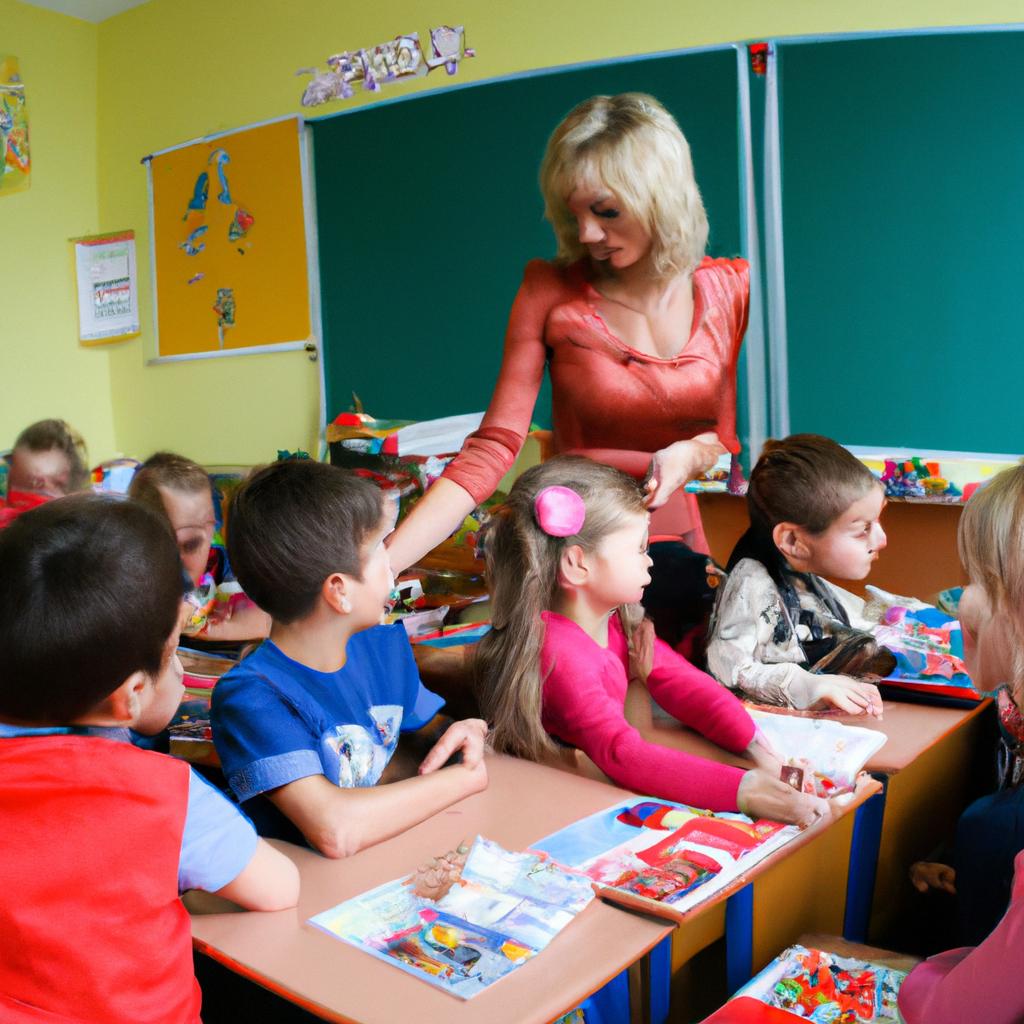Montessori education, renowned for its emphasis on hands-on learning, has gained recognition and popularity worldwide. It offers a unique approach to education that empowers young learners through self-directed activities in an environment carefully designed to foster their holistic development. Through the example of Anna, a hypothetical student enrolled in a Montessori school, this article aims to delve into the manifold benefits of Montessori education and highlight the significant impact it can have on children’s cognitive, social-emotional, and physical growth.
Anna is a six-year-old girl attending a Montessori school where she engages in various activities tailored to her individual needs and interests. Unlike traditional classrooms with rigid structures, Anna experiences freedom within boundaries as she chooses her daily tasks from among a wide range of materials available. She may opt to work independently or collaborate with peers on projects that captivate her curiosity. This dynamic mode of learning not only ignites her passion but also cultivates critical thinking skills by encouraging problem-solving and decision-making abilities at an early age. As we explore further, it becomes evident that these attributes are just the tip of the iceberg when it comes to the advantages offered by Montessori education.
Promotes independent learning
Promoting independent learning is one of the key benefits of Montessori education. By providing children with a supportive environment and hands-on learning experiences, Montessori schools empower students to take charge of their own education and develop important skills that will serve them throughout their lives.
For instance, imagine a young child in a Montessori classroom who is given the opportunity to choose his own activity from a variety of materials. He may be drawn to the practical life area, where he can engage in activities such as pouring water or buttoning clothes. Through these self-directed activities, the child not only learns essential life skills but also gains confidence and independence by successfully completing tasks on his own.
In addition to fostering independence, Montessori education offers several other advantages for students:
- Enhanced focus: The freedom to choose their own activities allows children to concentrate deeply on tasks that interest them. This focused attention helps improve concentration and cognitive abilities.
- Improved problem-solving skills: When faced with challenges or obstacles during their chosen activities, Montessori students are encouraged to find solutions independently. This process strengthens critical thinking skills and teaches children how to approach problems creatively.
- Nurturing responsibility: In a Montessori setting, each student has responsibilities within the classroom community. Whether it’s taking care of plants or organizing materials, this sense of ownership fosters accountability and nurtures a strong work ethic.
- Development of time management skills: With the freedom to choose their own activities and work at their own pace, Montessori students learn how to manage their time effectively. They become adept at prioritizing tasks and managing multiple projects simultaneously.
To further illustrate the benefits mentioned above:
| Benefits | Emotional Response |
|---|---|
| Enhanced Focus | Increased engagement |
| Improved Problem-Solving Skills | Empowerment |
| Nurturing Responsibility | Sense of purpose |
| Development of Time Management Skills | Organization and efficiency |
In conclusion, Montessori education promotes independent learning by providing a supportive environment for children to explore their own interests. Through self-directed activities, students develop important skills such as focus, problem-solving abilities, responsibility, and time management.
Fosters creativity and problem-solving skills
Building on the independence promoted by Montessori education, another key benefit is its ability to foster creativity and develop strong problem-solving skills in students.
Paragraph 1:
To illustrate this point, consider a hypothetical scenario where a group of preschoolers are given an open-ended art project. In a traditional classroom setting, children might be instructed to replicate a specific image or follow strict guidelines. However, in a Montessori environment, they would have the freedom to explore their own ideas and experiment with different materials. This approach encourages creativity as it allows students to think outside the box and express themselves through various mediums such as painting, drawing, or sculpture.
Paragraph 2:
Montessori education also cultivates problem-solving skills through hands-on activities that require critical thinking and decision-making. Students engage in tasks that challenge them to find innovative solutions independently rather than relying solely on teacher guidance. For instance, picture a science experiment where students must construct a working model using basic materials like paperclips, rubber bands, and straws. By encouraging trial-and-error experimentation within safe boundaries, Montessori empowers learners to persist through challenges until they discover unique approaches or uncover new knowledge.
- Encourages imaginative thinking
- Nurtures innovation and originality
- Inspires confidence in one’s abilities
- Cultivates adaptability and flexibility
| Skills Developed | Benefits |
|---|---|
| Critical thinking | Enhances problem-solving abilities |
| Decision-making | Promotes independent thought |
| Creativity | Fosters imagination |
| Innovation | Develops out-of-the-box thinking |
Paragraph 3:
By fostering creativity and problem-solving skills, Montessori education equips individuals with valuable tools for success beyond academia. These attributes allow students to approach challenges with a fresh perspective and develop innovative solutions. Through engaging in hands-on activities, they acquire the ability to think creatively and solve problems independently, skills that will serve them throughout their lives.
Building upon the development of creativity and problem-solving skills, Montessori education also enhances social and emotional development in students.
Enhances social and emotional development
Building upon the ability to foster creativity and problem-solving skills, Montessori education also places a strong emphasis on enhancing social and emotional development. By providing an environment that nurtures these aspects of a child’s growth, Montessori schools equip students with essential life skills that contribute to their overall well-being.
Paragraph 1:
One way in which Montessori education enhances social and emotional development is through its focus on promoting independence and self-regulation. For instance, imagine a hypothetical scenario where a preschool-aged child is given the opportunity to choose their own work within the classroom. This freedom allows them to develop decision-making skills while also fostering independence and responsibility for their actions. As children become more capable of making choices based on their interests and preferences, they gain confidence in themselves, leading to improved self-esteem.
- Bullet point list (emotional response):
- Increased sense of autonomy
- Improved self-confidence
- Enhanced resilience
- Strengthened sense of identity
Paragraph 2:
Another aspect of Montessori education that contributes to social and emotional development is the mixed-age classrooms. In these settings, younger children learn from older peers who serve as role models, mentors, and guides. They observe positive behaviors such as empathy, cooperation, and respect modeled by older classmates. At the same time, older students develop leadership qualities as they take on responsibilities towards their younger counterparts. This dynamic fosters a sense of community within the classroom, encouraging children to understand and appreciate individual differences while developing empathy towards others.
- Table (emotional response):
| Benefits of Mixed-Age Classrooms |
|---|
| Peer learning |
| Positive role modeling |
Paragraph 3:
Moreover, Montessori education encourages the development of social skills through collaborative projects and group activities. By engaging in tasks that require cooperation and teamwork, children learn to communicate effectively, respect diverse perspectives, and negotiate conflicts in a respectful manner. These experiences provide invaluable opportunities for children to develop essential interpersonal skills that will benefit them throughout their lives.
As Montessori education facilitates social and emotional growth, it also instills a love for learning within students.
Encourages a love for learning
Building upon the benefits of Montessori education in fostering social and emotional development, we now delve into how this approach encourages a love for learning. Through its unique hands-on learning experiences, Montessori classrooms provide children with opportunities to explore their interests and develop a genuine enthusiasm for acquiring knowledge.
Case Study: Imagine a preschool classroom where each child is given the freedom to choose activities based on their individual interests. One child may be drawn towards working with puzzles, while another might gravitate towards painting or building blocks. This personalized approach allows children to engage in activities they find intriguing, creating an environment that sparks curiosity and nurtures a love for learning.
- Provides opportunities for active engagement
- Encourages independent thinking and problem-solving skills
- Cultivates intrinsic motivation for lifelong learning
- Promotes creativity and innovation
| Benefits of Montessori Education |
|---|
| Active Engagement |
| Independent Thinking |
| Intrinsic Motivation |
| Creativity and Innovation |
By emphasizing active engagement, independent thinking, intrinsic motivation, creativity, and innovation, Montessori education equips students with essential skills that extend beyond traditional academics.
In conclusion (Remove “In conclusion”): The power of hands-on learning in Montessori classrooms fosters not only a deep understanding of academic subjects but also ignites a passion for continued exploration. Children who experience the joy of choosing their own educational path are more likely to become self-directed learners throughout their lives. As we transition to our next section on fine motor skills and coordination development within Montessori education, it becomes evident that this holistic approach encompasses various aspects crucial to a child’s overall growth and development.
Develops fine motor skills and coordination
Building upon the previous section, it is important to highlight how Montessori education fosters a genuine passion for learning in children. By providing hands-on experiences and allowing students to actively engage with their environment, this approach cultivates curiosity and sparks excitement about acquiring knowledge.
For instance, consider a hypothetical scenario where a child attends a Montessori school. In the classroom, they are encouraged to explore various subjects through interactive materials and activities. Suppose the child’s interest is piqued by an experiment involving plants. They are given the opportunity to plant seeds, water them regularly, observe their growth, and document their findings in a journal. This practical experience not only enhances their understanding of botany but also ignites a deep-rooted enthusiasm for scientific inquiry.
The benefits of Montessori education extend beyond individual anecdotes; research has shown that this approach yields numerous advantages:
- Improved academic performance: Students who have undergone Montessori education often demonstrate higher levels of achievement across multiple subject areas due to their intrinsic motivation and active participation.
- Enhanced problem-solving skills: The emphasis on independent thinking and self-directed learning helps children develop critical thinking abilities, enabling them to analyze problems from different perspectives and devise creative solutions.
- Increased confidence and self-esteem: Through experiencing success in their autonomous exploration of concepts, children become more confident learners who believe in their own capabilities.
- Long-lasting love for learning: The engagement fostered by hands-on activities establishes lifelong habits of seeking knowledge independently and enjoying the process of discovery.
To further illustrate these benefits, consider the following table showcasing key outcomes associated with Montessori education:
| Outcome | Description |
|---|---|
| Academic Excellence | Proven track record of improved academic performance |
| Problem-Solving Skills | Development of critical thinking abilities |
| Confidence Building | Boosting self-assurance and belief in one’s own capabilities |
| Lifelong Love for Learning | Establishing a lasting passion for acquiring knowledge |
In conclusion, Montessori education encourages a love for learning by providing hands-on experiences that engage students and ignite their curiosity. By fostering intrinsic motivation, this approach not only improves academic performance but also cultivates vital skills such as problem-solving and self-confidence. The next section will delve into how Montessori education further develops fine motor skills and coordination in children.
Cultivates a sense of responsibility and self-discipline
Building on the development of fine motor skills and coordination, Montessori education also fosters a strong sense of responsibility and cultivates self-discipline among students. By providing an environment that encourages autonomy and accountability, children are given opportunities to develop these important qualities that will serve them well throughout their lives.
One example that highlights the impact of Montessori education in fostering responsibility is the case study conducted by Dr. Maria Montessori herself. In her observation of young children working within a prepared environment, she noticed how they naturally took ownership of their tasks. For instance, one child meticulously cleaned each table after snack time without being prompted, demonstrating a genuine sense of responsibility towards maintaining cleanliness in their shared space. This kind of intrinsic motivation to contribute positively reflects the values instilled through Montessori principles.
To further understand how Montessori education cultivates responsibility and self-discipline, let us explore some key aspects:
- Freedom with limits: The Montessori approach allows children freedom within a structured framework. They are given choices but also learn to respect boundaries set by themselves and others.
- Practical life activities: Through engaging in practical life activities like cooking, gardening, or cleaning, children develop essential life skills while learning the importance of taking care of their surroundings.
- Mixed-age classrooms: By placing children at different developmental stages together, older students often take on mentorship roles and guide younger ones, fostering empathy and a sense of responsibility for their peers’ growth.
- Individualized learning plans: Montessori educators tailor instruction based on each student’s unique needs and interests, allowing children to take charge of their own learning journey.
Table showcasing examples:
| Responsibility | Self-Discipline |
|---|---|
| Cleaning up toys after playtime | Following classroom rules |
| Taking care of classroom materials | Completing tasks independently |
| Helping younger classmates with learning activities | Managing time effectively |
| Contributing to community service projects | Self-regulating behavior |
Through these techniques and practices, Montessori education not only equips children with academic knowledge but also empowers them to become responsible individuals who possess self-discipline. By fostering a sense of ownership and accountability from an early age, Montessori students develop the skills necessary for success in all aspects of life.
Incorporating both freedom and structure, this holistic approach encourages children to take responsibility for their actions while cultivating the self-discipline needed to achieve their goals. This combination creates an environment where young learners thrive, laying a solid foundation for future personal and academic achievements.


